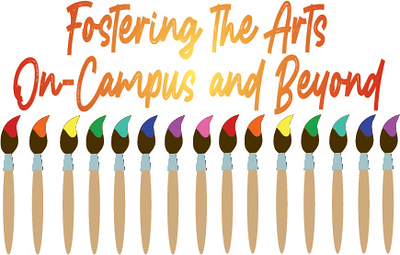Fostering the arts on-campus and beyond
October 4, 2019
Looking to host a poetry slam event on campus? Or, do you want to start your very own dance ensemble, different from what the University already offers? Do you have an idea to enhance the arts at the University, but don’t have enough money or resources to do so? If this is the case, check out the University’s arts council grants.
What is the Arts Council?
According to its website, the University’s Arts Council (BAC) is an alliance seeking to promote artistic collaboration and enhancement on campus. The BAC is comprised of various arts departments and centers across campus, including the Department of Art & Art History, the Campus Theatre, the creative writing and film/media studies programs of the Department of English, the Griot Institute for the Study of Black Lives & Culture, the Department of Music, the Samek Art Museum, the Stadler Center for Poetry & Literary Arts, the Department of Theatre & Dance, the Weis Center for the Performing Arts, the University Arts Coordinator, and the Associate Dean of Arts & Humanities.
This alliance of the arts is able to offer Arts & Creativity grants to students who are passionate about pursuing serious projects or research in the arts that will benefit the community. In addition, generous donations have made the High-Impact Acts Teaching and Research grants possible, awards which are given to faculty who support the arts at the University.
Who receives the grants?
“These grants are open to students from any discipline,” Andrew Ciotola, the Stadler Center for Poetry program manager and University arts coordinator, said. The maximum award for these student grants is $2,500, and the students participating are obligated to have at least a 3.0 GPA, among other requirements that are listed on the University’s webpage.
“The mission of the BAC is to advance and enhance the arts at [the University],” Ciotola said. “One way we realize this mission is to create space, through the gift of resources, for artists, performers, and teachers, to pursue their artistic interests. Many of the projects we fund have a direct impact on the campus arts environment. For instance, an Arts & Creativity grant provided funding for the wildly successful LitFest 2018, a student-organized literary festival featuring the work of students of color. LitFest shows every sign of becoming an annual tradition.”
Through these grants, the BAC has sent students to visit the world-famous Cannes Film Festival, to Indonesia to study dance techniques, to Australia for research in music education and to Germany for a fiction project on folktales.
“Closer to home, we’ve provided supplies and funding for all manner of art, music, and film projects, underwritten screenings at the Campus Theatre, and brought in arts professionals for workshops in several disciplines,” Ciotola said. “In the High-Impact line, we’ve helped faculty members enrich their courses with visiting artists, funded class trips to museums and performances, and sent faculty to libraries, collections, conferences, and workshops for arts research.”
An Example: LitFest 2018
Jessica Henson ’20, a creative writing and film & media studies double-major, was a member of the group that created and planned LitFest — the University’s first annual literary event for students of color. With the guidance of Assistant Professor of English Joe Scapellato, Henson and her group were able to apply for and receive one of the Arts & Creativity grants offered by the BAC.
“Our goal was to spearhead an annual event that gives student writers and artists a space to perform and engage in an artistic community,” Henson said. “We wanted to celebrate artistic forms with a literary root.” Last year, LitFest welcomed spoken word collaborations, poetry, prose, painting, dancing, singing, musical ensembles and bands. In addition to creating posters to help advertise the event across campus, Henson’s group specifically reached out to cultural organizations and professors involved in the arts at the University; however, all were welcomed at the event.
“The event was well-attended. We all were proud and excited about the energy in the room,” Henson said. The grant from the BAC allowed Henson and her group to begin the tradition of LitFest at the University, as the award contributed toward the cost of food, giveaways, and decorations at the event and the design of posters to advertise the event.
“All those things added to the synergistic event,” Henson said. “BAC helped us begin hopefully a long-lasting tradition at [the University]. We are very grateful. It’s not just about the funds, but we appreciate the support of the committee and how they believe in us and the importance of how art can impact others deeply.”
Henson and the rest of her group members are looking forward to beginning to plan the next annual LitFest. Other students at the University with an interest in the arts have the same opportunity to create their own tradition and spread the love of the arts across campus and abroad.
Working at the Stadler Center for Poetry and its publication, West Branch, Ciotola has seen the benefits of the arts at the University first-hand, as well as in the greater world; the BAC grants help spread these benefits to a greater community. “Practicing, studying, and appreciating the arts rounds out our humanity by giving us insight on what we have in common with others, what we share as a species,” Ciotola said. “The word for this is empathy and the world needs more of it. For this reason, the arts are essential to a complete liberal arts education.”
More information about the application process and on student and faculty grants offered through the University’s Arts Council can be found on the BAC’s webpage.





















